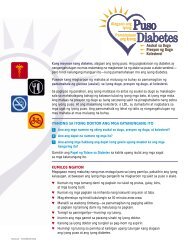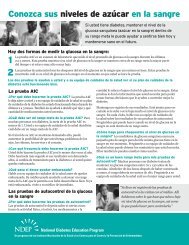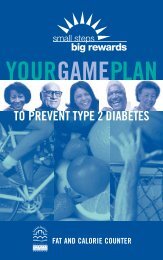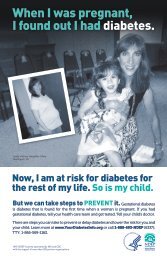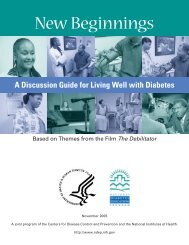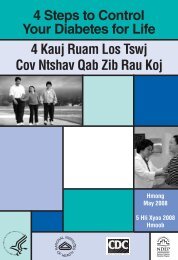Power to Prevent - National Diabetes Education Program - National ...
Power to Prevent - National Diabetes Education Program - National ...
Power to Prevent - National Diabetes Education Program - National ...
You also want an ePaper? Increase the reach of your titles
YUMPU automatically turns print PDFs into web optimized ePapers that Google loves.
If you fnd you are denying some parts of your diabetes care, ask your diabetes educa<strong>to</strong>r or health<br />
care provider for help. If you have trouble with your food plan, ask your health care provider <strong>to</strong><br />
refer you <strong>to</strong> a registered dietitian for help. Together you can come up with solutions.<br />
Tell your friends and family how they can help. Let them know that insisting that you try dessert or<br />
take that second serving doesn’t help. Inform them about how you take care of your diabetes. They<br />
might want <strong>to</strong> adopt some of your healthy habits.<br />
Depression<br />
Feeling down once in a while is normal. But some people feel a sadness that just won’t go away. Life<br />
seems hopeless. Feeling this way most of the day for 2 weeks or more is a sign of serious depression.<br />
At any given time, most people with diabetes do not have depression. But studies show that people<br />
with diabetes have a greater risk for depression than people without diabetes. There are no easy<br />
answers about why this is true.<br />
The stress of daily diabetes management can build up. You may feel alone or set apart from your<br />
friends and family because of all this extra work.<br />
If you face diabetes complications such as nerve damage, or if you are having trouble keeping<br />
your blood glucose (sugar) levels where you’d like, you may feel as if you’re losing control of your<br />
diabetes. Tension between you and your doc<strong>to</strong>r may make you feel frustrated and sad.<br />
Just like denial, depression can get you in<strong>to</strong> a vicious cycle. It can block good self-care for diabetes.<br />
If you are depressed and have no energy, chances are that you will fnd such tasks as regular blood<br />
glucose testing <strong>to</strong> be <strong>to</strong>o much. If you feel so anxious that you can’t think straight, it will be hard <strong>to</strong><br />
keep up with eating a good diet. You may not feel like eating at all, or you may eat more unhealthful<br />
food. Of course, both of these actions will affect your blood glucose levels.<br />
What <strong>to</strong> Do?<br />
Spotting depression is the frst step in dealing with it. Getting help is the second. If you have been<br />
feeling really sad, blue, or down in the dumps, check for these symp<strong>to</strong>ms of depression:<br />
Loss of pleasure. You no longer take interest in doing things you used <strong>to</strong> enjoy.<br />
Change in sleep patterns. You have trouble falling asleep, you wake often during the night, or<br />
you want <strong>to</strong> sleep more than usual, including during the day.<br />
Early awakening. You wake up earlier than usual and cannot <strong>to</strong> get back <strong>to</strong> sleep.<br />
Change in appetite. You eat more or less than you used <strong>to</strong>, and the result is a quick weight gain or<br />
weight loss.<br />
Trouble concentrating. You can’t watch a TV program or read a magazine because other thoughts<br />
or feelings get in the way.<br />
Loss of energy. You feel tired all the time.<br />
Nervousness. You always feel so anxious that you can’t sit still or fnish something you started.<br />
Guilt. You feel you “never do anything right” and worry that you are a burden <strong>to</strong> others.<br />
Morning sadness. You feel worse in the morning than you do the rest of the day.<br />
NDEP <strong>Power</strong> <strong>to</strong> <strong>Prevent</strong> Appendices 89



